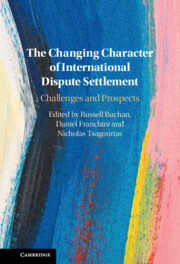Book contents
- The Changing Character of International Dispute Settlement
- The Changing Character of International Dispute Settlement
- Copyright page
- Contents
- Contributors
- Foreword
- Acknowledgements
- Table of Cases
- Table of International Instruments
- Table of Legislation
- Abbreviations
- Introduction
- Part I Recent Trends and Cross-Cutting Issues in International Dispute Settlement
- 1 The Obligation of Peaceful Settlement of International Disputes
- 2 Parallel Proceedings Concerning Investment and Human Rights Claims
- 3 The Mosaic of International Dispute Settlement
- 4 Binding Advisory Opinions
- Part II Effectiveness, Authority, and Legitimacy of the Current System of International Dispute Settlement and Possible Reforms
- Part III New Opportunities and the Future of International Dispute Settlement
- Index
3 - The Mosaic of International Dispute Settlement
The Role of Domestic Courts in International Dispute Settlement
from Part I - Recent Trends and Cross-Cutting Issues in International Dispute Settlement
Published online by Cambridge University Press: 14 December 2023
- The Changing Character of International Dispute Settlement
- The Changing Character of International Dispute Settlement
- Copyright page
- Contents
- Contributors
- Foreword
- Acknowledgements
- Table of Cases
- Table of International Instruments
- Table of Legislation
- Abbreviations
- Introduction
- Part I Recent Trends and Cross-Cutting Issues in International Dispute Settlement
- 1 The Obligation of Peaceful Settlement of International Disputes
- 2 Parallel Proceedings Concerning Investment and Human Rights Claims
- 3 The Mosaic of International Dispute Settlement
- 4 Binding Advisory Opinions
- Part II Effectiveness, Authority, and Legitimacy of the Current System of International Dispute Settlement and Possible Reforms
- Part III New Opportunities and the Future of International Dispute Settlement
- Index
Summary
In this chapter, Kimberley Trapp and Jacob Smith examine the role of domestic courts in international dispute settlement. This chapter maps the variety of engagements by international dispute settlement bodies with the decisions and processes of domestic courts and explores how the particular institutional nature and contexts of international dispute settlement bodies may colour the nature and degree of that engagement. The chapter situates this engagement on a spectrum of deference to greater intrusion. It also provides an illustration of the factors that determine this engagement, including the degree of penetration of the international legal framework in domestic legal systems, the expectations that States have when submitting to means of dispute settlement, and the socio-legal context.
Keywords
- Type
- Chapter
- Information
- The Changing Character of International Dispute SettlementChallenges and Prospects, pp. 76 - 105Publisher: Cambridge University PressPrint publication year: 2023

